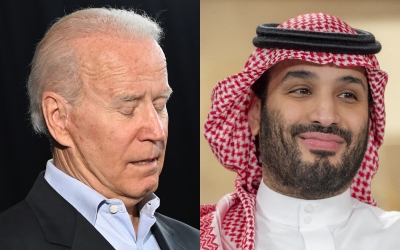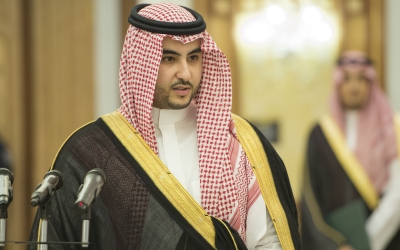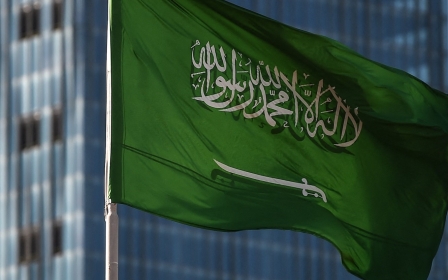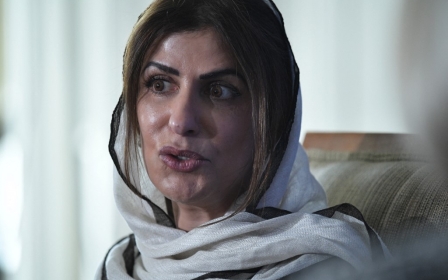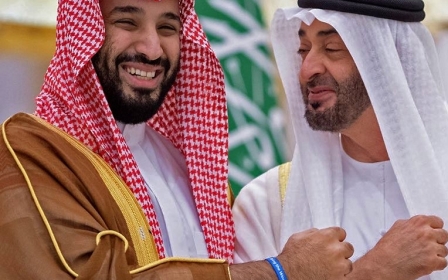'Abhorrent': Rights advocates denounce US welcome for Saudi prince
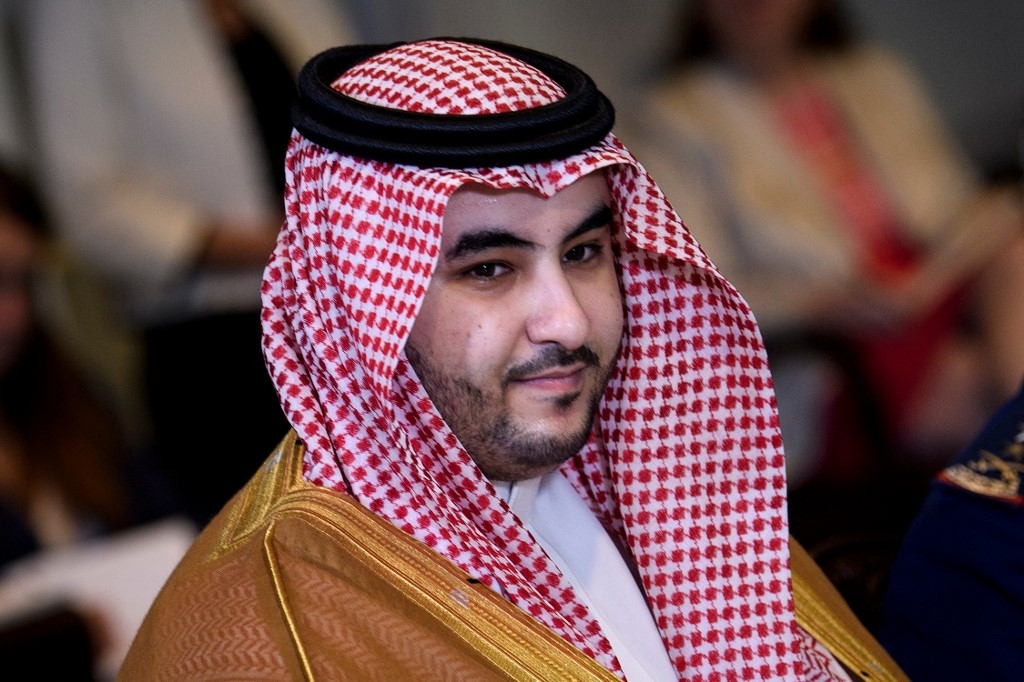
Rights groups have decried the Biden administration's decision to welcome Saudi Arabia's Deputy Defence Minister Prince Khalid bin Salman in Washington, saying it shows the US president is reneging on his promise to have a foreign policy centred on human rights.
"Our reaction is one of abhorrence and disgust," Sarah Leah Whitson, executive director of Democracy for the Arab World Now (DAWN), told Middle East Eye on Wednesday.
"But I can't say it's one of shock. The Biden administration made it very clear that it wasn't serious about changing the relationship with Saudi Arabia."
Prince Khalid, the younger brother of powerful Crown Prince Mohammed bin Salman (MBS), arrived in the US late on Tuesday in a visit that was not publicly disclosed by the White House.
The royal met with senior US officials - including US Defence Secretary Lloyd Austin; General Mark Milley, the chairman of the Joint Chiefs of Staff; and National Security Advisor Jake Sullivan - where they discussed the war in Yemen, military contracts and Saudi concerns over Washington's efforts to return to a nuclear agreement with Iran.
The meetings marked the highest-profile visit by a Saudi official since the Biden administration declassified an intelligence assessment surrounding the killing of Middle East Eye columnist Jamal Khashoggi.
US President Joe Biden had previously promised to make a pariah out of Saudi Arabia over the murder and issued sanctions and travel bans on a number of individuals implicated in the killing, but stopped short of punishing MBS.
Khashoggi was brutally killed at the Saudi consulate in Istanbul in October 2018, where he had gone to retrieve documents for his upcoming marriage.
At the time, Prince Khalid told Khashoggi that it would be safe for him to go to the consulate, according to the Washington Post.
"Khalid himself is implicated in the plot to lure Khashoggi from the United States to Istanbul, where they proceeded to butcher him," Whitson said. "How is it that the so-called ban is not used in the very first case when it could be?"
'Falling short'
On Tuesday, White House press secretary Jen Psaki said the murder of Khashoggi could be a topic of conversation during the prince's visit.
While officials did not confirm whether the murder was raised with the prince, a White House statement said that Washington "emphasized the importance of progress in advancing human rights in the Kingdom".
Human rights advocates and NGOs have for months called on the Biden administration to hold Saudi Arabia to account over its dismal human rights record.
'It's a missed opportunity to stand with and for Saudi human rights defenders'
- Andrea Prasow, Human Rights Watch
And while they have applauded some efforts, including ending offensive support for the Saudi-led coalition's war in Yemen, they say the administration is continuing to fall short of its commitments.
"The administration is falling far short of its stated emphasis on human rights and the need to hold the murders of Jamal Khashoggi accountable and centre human rights in the relationship," Seth Binder, advocacy director at the Project on Middle East Democracy, told MEE.
"There's any number of things that the administration can and should be doing, and they need to do those with this visit, with future engagements with other Saudi officials, and going forward. And they haven't lived up to that."
Prince Khalid's visit comes as the kingdom continues to keep a number of rights advocates in detention and represses peaceful activism and dissent across the country.
Last month, the Human Rights Measurement Initiative (HRMI) named Riyadh the second-worst country in the world for human rights.
The HRMI's index cited the government's ban on protests, limits on free expression and civil society organisations, and the inability of citizens to vote or participate in public life.
A number of Saudi royals have also been detained as part of a crackdown by MBS, including Saudi Princess Basmah bint Saud, who has advocated in the past for reforms including creating a constitutional monarchy.
On Monday, representatives of the family of Princess Basmah filed an appeal with the UN requesting that the world body intervene in her case and demand Saudi authorities provide proof that she is alive.
Princess Basmah has been held incommunicado for over a year along with her daughter Suhoud al-Sharif.
'Quiet diplomacy'
Over the last few months, the Biden administration has relied on so-called "quiet diplomacy" to solve regional issues, something which was highlighted in the case of the 11-day Israeli bombardment of Gaza, in which Israeli air strikes killed at least 248 Palestinians in the besieged enclave, including more than 60 children.
While the administration lauded its efforts to achieve a ceasefire, Palestinian advocates heavily criticised the approach, saying that Biden had prolonged the war by blocking UN Security Council calls for an immediate ceasefire.
Andrea Prasow, deputy Washington director of Human Rights Watch, said that the same problem with quiet diplomacy could be said of Saudi Arabia.
"If you never publicly condemn human rights abuses, that's where the problem comes down. And I think that's what we're really facing with Saudi Arabia," Prasow told Middle East Eye.
"Although the US has condemned both human rights abuses and others, of course, in Saudi Arabia, it's hard to take it seriously when it doesn't take that final step."
Prasow said that while raising these issues in private would be welcome news, "it does not address the need for public accountability, and most important, it's a missed opportunity to stand with and for Saudi human rights defenders".
Middle East Eye delivers independent and unrivalled coverage and analysis of the Middle East, North Africa and beyond. To learn more about republishing this content and the associated fees, please fill out this form. More about MEE can be found here.


